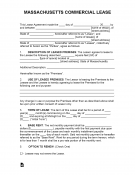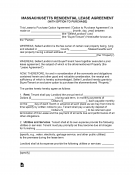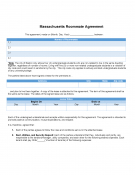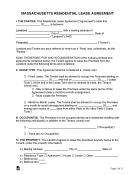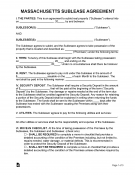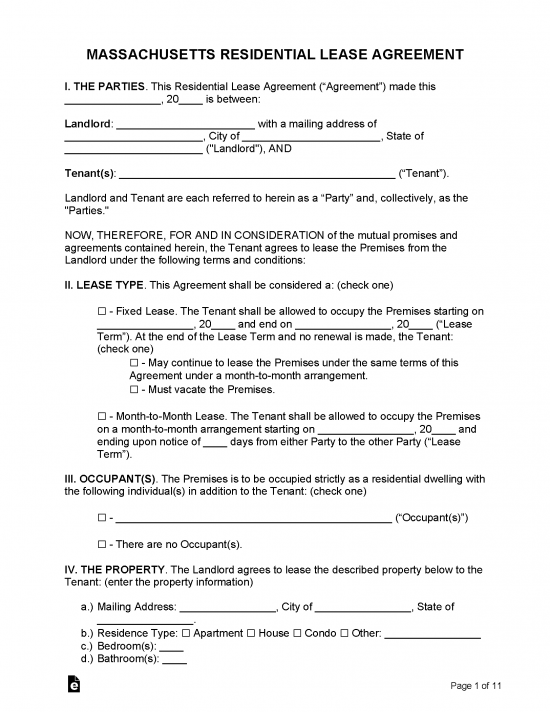Massachusetts lease agreements are contracts that govern the exchange of rent between a tenant and a landlord. Along with specifying the monthly rent, lease agreements will include key obligations of the landlord and the tenant, such as responsibility for utilities or particular repairs. Both parties should maintain a copy of the lease agreement, and refer to it to prevent lingering disputes.
Contents
- Massachusetts Lease Agreements: By Type (6)
- Landlord-Tenant Laws
- Handbooks and Guides
By Type (6)
- Commercial Lease Agreement
- Month-to-Month Lease Agreement
- Rent-to-Own Lease Agreement
- Roommate Lease Agreement
- Standard Lease Agreement
- Sublease Agreement
Download: Adobe PDF, MS Word, Rich Text Format
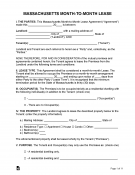 Month-to-Month Lease Agreement
Month-to-Month Lease Agreement
Download: Adobe PDF, MS Word, Rich Text Format
Download: Adobe PDF, MS Word, Rich Text Format
Download: Adobe PDF, MS Word, Rich Text Format
Download: Adobe PDF, MS Word, Rich Text Format
Download: Adobe PDF, MS Word, Rich Text Format
Landlord-Tenant Laws
Statutes – General Laws, Chapter 186 (Landlord-Tenant Law)
Required Disclosures (5)
Fire Insurance – Within fifteen (15) days of the beginning of a lease, a landlord must disclose the terms and conditions of the property’s fire insurance policy (ch. 186, § 21).
Inventory Checklist – Within ten (10) days of either receiving the security deposit or the beginning of a lease, whichever is later, the landlord must provide a form that allows a tenant to write down any and all repairs needed or defects on the premises. If a tenant does request a checklist, the tenant will have fifteen (15) days to return the inventory checklist to the landlord (ch. 186, § 15B(2)(b)).
Landlords are required to include this statement in the inventory checklist:
This is a statement of the condition of the premises you have leased or rented. You should read it carefully in order to see if it is correct. If it is correct you must sign it. This will show that you agree that the list is correct and complete. If it is not correct, you must attach a separate signed list of any damage which you believe exists in the premises. This statement must be returned to the landlord or his agent within fifteen days after you receive this list or within fifteen days after you move in, whichever is later. If you do not return this list, within the specified time period, a court may later view your failure to return the list as your agreement that the list is complete and correct in any suit which you may bring to recover the security deposit.
Lead-Based Paint Disclosure – Federal law mandates that landlords for properties built before 1978 must disclose to the tenant or tenants the risks of lead-based paint.
Security Deposit Receipt – If a landlord chooses to seek a security deposit from a tenant, the landlord must provide the tenant with a receipt that includes the amount, the name of the person accepting it, the date the deposit was delivered, and a description of the premises that the tenant will be occupying. The person accepting the security deposit must sign this form (ch. 186, § 15B(2)(c)).
Follow-up Deposit Statement – Within thirty (30) days of receiving a security deposit, a landlord must provide to a tenant an additional statement, separate from the receipt mentioned above, identifying: the name and location of the bank where the security deposit is being held; the amount of deposit; and the number of the account in which it is being held (ch. 186, § 15B(3)(a)).
Security Deposit Laws
Maximum Amount ($)
Landlords may charge no more than one (1) month’s rent for a security deposit, reflected in the rental rate when a tenant’s lease begins (ch. 186, § 15(B)(iii)).
Returning to Tenant
A landlord who accepts a security deposit from a tenant must return the deposit to the tenant within thirty (30) days of the end of the tenancy. The landlord may retain a portion of the security deposit for any unpaid rent or utility charges owed by the tenant, unaccounted for increases in property taxes where the lease agreement assigns responsibility for these costs to the tenant, and the cost of repairs to the dwelling unit that are necessary due to the actions of the tenant or the tenant’s guests, agents or family. The landlord cannot retain a portion of the security deposit for any reason other than these. Repairs that are part of the reasonable wear and tear of a tenancy may not be addressed with a security deposit (ch. 186, §15B(4)).
When is Rent Due? (grace period)
Rent is due at the time and place agreed upon in the rental agreement. For the purpose of fees, rent is not considered late until thirty (30) days after it is due (ch. 186, § 15(1)(c)).
Eviction Notice (non-payment)
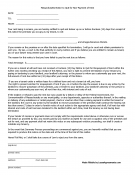 14-Day Notice to Pay or Quit – If a tenant fails to pay rent on time, the landlord may post this notice, which alerts a tenant that the landlord has a right to begin eviction proceedings if the tenant fails to pay the amount owed within fourteen (14) days. The landlord or an agent should also use this form, which includes necessary information, to indicate that the tenant has received notice. Tenants should note that the notice is not itself an eviction, and that if nonpayment is connected to some failure by a local, state or federal government agency, the tenant automatically has an additional seven (7) days to pay (ch. 186, § 11).
14-Day Notice to Pay or Quit – If a tenant fails to pay rent on time, the landlord may post this notice, which alerts a tenant that the landlord has a right to begin eviction proceedings if the tenant fails to pay the amount owed within fourteen (14) days. The landlord or an agent should also use this form, which includes necessary information, to indicate that the tenant has received notice. Tenants should note that the notice is not itself an eviction, and that if nonpayment is connected to some failure by a local, state or federal government agency, the tenant automatically has an additional seven (7) days to pay (ch. 186, § 11).
Download: Adobe PDF
Maximum Fees ($)
Late Rent Penalties
Massachusetts does not set limits on how much a landlord may charge as a late fee, but note that the state does not permit late fees to be imposed until at least 30 (thirty) days after rent is due (ch. 186, § 15(B(1)(c)).
NSF Checks
Massachusetts law is silent on the amount landlords may charge tenants for offering rent checks with insufficient funds, but best practice is to name the fee in the rental agreement, and for the fee to be reasonable.
Tenant’s Unclaimed Property
If the tenant leaves behind personal property following an eviction, the landlord must store the property at a public warehouse. The keeper of the warehouse must provide notice of the stored personal property to the former tenant within seven (7) days of receiving it. The landlord must pay the cost of storing the property, but is entitled to reimbursement from the tenant. The warehouser shall not sell any of the tenant’s property for at least six (6) months after providing the notice to the tenant, and may not sell it for an additional three (3) months if during that time the tenant reimburses the landlord for at least half of the storage costs to that point (ch. 239, § 4).
